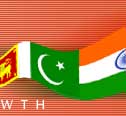|
Security and Governance in
South Asia 
PR Chari (Ed) New Delhi: Manohar Publishers, 2001
The theoretical problem addressed
in this book is discovering the nexus between security
and governance in South Asia. Leading scholars of
the region have contributed their individual country
perspectives on this difficult question. They have
scrutinized the conceptual questions that arise by
passing under review the systemic challenges to the
process of governance in the region to discern linkages
between insecurity and misgovernance.
Human Security in South Asia:
Gender, Migration and Globalisation
PR Chari and Sonika Gupta (Ed) New Delhi: Social Science
Press, 2003
Human Security in South Asia: Gender,
Migration and Globalisation argues for a c oncept
of security that extends beyond the conventional domain
of military threats to include those that fall outside
it. Non-military threats are rooted in social, economic,
ecological and political choices made by the country,
but are frequently left out in the decision-making
process. Very often these threats jeopardize the economic
development, social fabric and political stability
of the nation. This book discusses the non-military
threats arising from misgovernance, competition for
energy resources, migration, the negative effects
of globalisation and gender discrimination. It maintains
that by failing to protect its people adequately from
these dimensions of non-military threats, the state
endangers the overall security of its people. Military
and non-military threats cannot be looked at in isolation
of each other. The dangers arising from military threats
are well understood. Those arising from non-military
threats if not similarly understood will undermine
the security of the countries of South Asia. oncept
of security that extends beyond the conventional domain
of military threats to include those that fall outside
it. Non-military threats are rooted in social, economic,
ecological and political choices made by the country,
but are frequently left out in the decision-making
process. Very often these threats jeopardize the economic
development, social fabric and political stability
of the nation. This book discusses the non-military
threats arising from misgovernance, competition for
energy resources, migration, the negative effects
of globalisation and gender discrimination. It maintains
that by failing to protect its people adequately from
these dimensions of non-military threats, the state
endangers the overall security of its people. Military
and non-military threats cannot be looked at in isolation
of each other. The dangers arising from military threats
are well understood. Those arising from non-military
threats if not similarly understood will undermine
the security of the countries of South Asia.
Nuclear Stability in Southern
Asia
PR Chari, Sonika Gupta and Arpit Rajain (Ed) New Delhi:
Manohar Publishers, 2003 
India?s and Pakistan?s reciprocal
nuclear tests in 1998 irrevocably altered the strategic
situation in Southern Asia and sparked off a global
debate on nuclear weapons, arms control and nuclear
deterrence. The trilateral nature of the nuclear adversarial
relation in the region, comprising the security concerns
of China, India and Pakistan, presents a challenge
to existing theories and practices of nuclear deterrence
premised on dyadic structures. The security situation
on the Indo-Pak border and its linkage with cross
border terrorism has serious implications for nuclear
deterrence in the region. The Kargil War, a conventional
war fought under the nuclear shadow, has thrown up
new challenges for Southern Asian nuclear stability.
This volume discusses different aspects of nuclear
weapons including doctrinal issues, nuclear confidence
building, terrorism and its linkages with nuclear
deterrence, and nuclear safety within the context
of Southern Asia. The book taps into the vast experience
of senior defence personnel involved in preparing
India?s draft nuclear doctrine and senior policy and
strategic analysts in the country to present a comprehensive
debate on nuclear stability in the region.
Missing Boundaries: Refugees,
Migrants, Stateless and Internally Displaced Persons
in South Asia
PR Chari, Mallika Joseph and Suba Chandran (Ed)
New Delhi: Manohar Publishers, 2003 
South Asia has 14 percent of the
world’s refugee population and is the principal
source and host of refugees. The causes behind the
displacement ? political instability, armed conflict,
lack of resources and so on in South Asia and its
immediate neighborhood have not declined but, in fact,
have been increasing; and the security threats posed
by the refugees and internally displaced persons (IDPs)
is set to increase given the lack of resources and
poor governance prevalent in the region. Yet, none
of the countries in South Asia have signed any major
convention or treaty at the international level in
regard to refugees; nor have they any national legislation
or regional framework to deal with these issues.A
comprehensive study focusing on the various dimensions
of displacement in South Asia including refugees,
migrants, stateless persons and internally displaced
persons (IDPs) was felt imperative by the Institute
of Peace and Conflict Studies.
Rethinking Security, UN and
the new Threats 
ED. Maj Gen. Dipankar Banerjee(Retd.) India Research
Press
A High Level Panel was subsequently
set-up by the UN Secretary General to examine the
critical threats and make recommendations to address
these through the United Nations.This Book reflects
the collective view from South Asia as to the nature
of these challenges and how to address them through
international action. This is a major contribution
to this enormously important debate around the world
in our times.
Ethnic Conflict and Secessionism
in South and Southeast Asia : Causes, Dynamics, Solutions/edited
by Rajat Ganguly and Ian Macduff. New Delhi, Sage
Pub., 2003, 292 p., ISBN 81-7829-202-5.
Contents: Foreword/Stephanie Lawson.
Introduction : the challenge of ethnic insurgency
and secession in South and Southeast Asia/Rajat Ganguly.
1. Secessionist ethnic conflict in South and Southeast
Asia: a comparative perspective/David Carment. 2.
An area of darkness, still? The political evolution
of ethnic identities in Jammu and Kashmir, 1947-2001/Vernon
Hewitt. 3. Ethnic conflict in Sindh and its impact
on Pakistan/Teesta Ghosh. 4. The Liberation Tigers
of Tamil Ealam insurgency in Sri Lanka/Peter Chalk.
5. Indonesia’s East Timor experience/Mark Rolls.
6. Ethno-communal conflict in the Phillippines: the
case of Mindanao-Sulu region/Syed Serajul Islam. 7.
Ethnosecession in Papua New Guinea: the Bougainville
case/Roderic Alley. Conclusion/Ian Macduff. Index.
Environment, Development
and Human Security: Perspectives from South Asia,
Edited by Adil Najam ,
University Press of America ,
University Press of America
The purpose of this collected volume
of essays is to build on and contribute to the larger
conceptual literature on environment and security.
In particular, the book seeks to fill one of the glaring
gaps within this stream of scholarship-- the inadequate
number of existing case studies for South Asia and
its component territories. Written entirely by the
leading scholars from South Asia, the book examines
a region that is the setting for some of the most
important environmental security challenges of our
time.
Nuclear Deterrence in Southern
Asia : China, India and Pakistan/Arpit Rajain. New
Delhi, Sage, 2005, 496 p., maps, figs., ISBN 81-7829-359-5.
Contents: Preface. 1. Introduction.
2. Nuclear weapons and internationa l
system. 3. Revisiting deterrence. 4. China. 5. India.
6. Pakistan. 7. Conclusions. References and select
bibliography. Index. l
system. 3. Revisiting deterrence. 4. China. 5. India.
6. Pakistan. 7. Conclusions. References and select
bibliography. Index.
"Since the time both India
and Pakistan conducted their nuclear tests in 1998,
a new strategic scenario has emerged in Southern Asia
involving not just these two countries but also China.
This has altered the security architecture of Asia
as a whole, and has given rise to a unique triangular
relationship. This 'triangularisation' of nuclear
power calls for new understandings which go beyond
the bilateral dialogues of the erstwhile Cold War
era.
In this important and topical book,
Arpit Rajain examines the triangular relationship
of China, India and Pakistan through the prism of
nuclear deterrence. He highlights the interplay and
role of strategic culture, nuclear weaponisation and
deployment, command and control, arms control, non-state
actors and foreign policy issues which affect relations
between the three countries.
Towards a Democratic Nepal
: Inclusive Political Institutions for a Multicultural
Society/Mahendra Lawoti. New Delhi, Sage, 2005, 348
p., tables, ISBN 81-7829-448-6.
Contents: Preface. I. The problem:
exclusion and its consequences: 1. Political exclusion
in democratizing Nepal. 2. Exclusion and violent conflicts
in Nepal: the Maoist insurgency and beyond. II. The
context : multicultural society, political exclusion
and majoritarian institutions: 3. Cleavages, conflicts
and sociocultural groups. 4. The constitution as the
source of exclusion. 5. Inclusion in multicultural
societies: accommodation through power sharing and
autonomy. III. A method for inclusion: democratic
deliberation: 6. A method for selecting inclusive
democratic political institutions. 7. The process
for designing an inclusive polity. IV. The solution:
inclusive democratic political institutions: 8. Federalism
and group autonomy: group rights, public policies
and inclusion. 9. Proportionality: inclusion through
equality and justice. 10. Constitutional protection
of minority rights. V. The future: a multicultural
democratic Nepal: 11. Multicultural democracy: congruence
between the state and society. References. Index.

Ethnic Futures : The State
and Identity Politics in Asia/Joanna Pfaff-Czarnecka,
Darini Rajasingham-Senanayake, Ashis Nandy and Edmund
Terence Gomez. 1999, 209 p., $19. ISBN 81-7036-827-8.
Contents: 1. Introduction/Joanna
Pfaff-Czarnecka and Darini Rajasingham-Senanayake.
2. Debating the state of the nation: ethnicization
of politics in Nepal--a position paper/Joanna Pfaff-Czarnecka.
3. Democracy and the problem of representation: the
making of Bi-polar ethnic identity in post/colonial
Sri Lanka/Darini Rajasingham-Senanayake. 4. Coping
with the politics of faiths and cultures: between
secular state and ecumenical traditions in India/Ashis
Nandy. 5. Tracing the ethnic divide: race, rights
and redistribution in Malaysia/Edmund Terence Gomez.
Index.
Contemporary Pakistan : Political
Processes, Conflicts and Crises/Veena Kukreja. New
Delhi, Sage, 2003, xviii, 350 p., tables, $26. ISBN
81-7829-146-0.
Contents: Introduction. 1. Struggle
for democracy: 1947-1958 and 1971-1977. 2. Military
and governance. 3. Political economy: near the brink
of collapse. 4. Ethnic divide: aspirations and political
power. 5. The rising tide of Islamic fundamentalism
in Pakistan. 6. The menace of Narco power: parallel
government. 7. Restoration of democracy and crisis
of governability: 1988-1999. 8. Persistent praetorianism:
Pakistan’s fourth military regime. 9. Authoritarianism,
democracy and development. Glossary. Select bibliography.
Index.
Internal Displacement in
South Asia : The Relevance of the UN's Guiding Principles/edited
by Paula Banerjee, Sabyasachi Basu Ray Chaudhury and
Samir Kumar Das. New Delhi, Sage, 2005, 370 p., $33.
ISBN 81-7829-443-5.
Contents: Foreword/Roberta Cohen
and Francis Deng. Introduction/Paula Banerjee, Sabyasachi
Basu Ray Chaudhury and Samir Kumar Das. 1. Afghanistan:
the long way home/Mossarat Qadeem. 2. Pakistan: development
and disaster/Atta ur Rehman Sheikh. 3. India: homelessness
at home/Samir Kumar Das. 4. India's northeast: nobody's
people in no-man's land/Subir Bhaumik. 5. Bangladesh:
displaced and dispossessed/Meghna Guhathakurta and
Suraiya Begum. 6. Burma: escape to ordeal/Sabyasachi
Basu Ray Chaudhury. 7. Nepal: a problem unprepared
for/Manesh Sreshtha and Bishnu Adhikari. 8. Sri Lanka:
a profile of vulnerability/Joe William. 9. Resisting
Erasure: women IDPs in South Asia/Paula Banerjee.
Epilogue: international law on the internally displaced
persons/David Fisher. Appendix: the UN guiding principles
on the internally displaced persons. Notes on editors
and contributors. Index.
The Idea of Pakistan.
Stephen Philip Cohen, senior fellow
in the Foreign Policy Studies program at the Brookings
Institution, USA, writes on how Pakistan in recent
years has emerged as a strategic player on the world
stage—both as a potential rogue state, armed
with nuclear weapons and as an American ally in the
war against terrorism. He offers a panoramic portrait
of the complex country – from its origins as
a homeland for Indian Muslims to a military-dominated
state that has experienced uneven economic growth,
political chaos, sectarian violence, and several nuclear
crises with its much larger neighbor, India.
Publication: Brookings Institution
Press 2004.
Himalayan 'People's War':
Nepal's Maoist Rebellion.
Edited by Michael Hutt, Reader in
Nepali at School of Oriental and Asian Studies, London.
The eruption of a violent Maoist insurgency in Nepal
in the late 1990s was met with bewilderment even among
many of those who claimed to know the country well.
Such a development possesses its own historical depth
and socio-cultural background. This book provides
much of that background and description of the ongoing
struggle.
Publication: Hurst & Co 2004.

'Between Heaven and Hell'
Travels through South Asia.
Soon after the nuclear tests conducted by India and
Pakistan in 1998, the celebrated explorer, author
and filmmaker Akhil Bakshi led an
18,000 km motoring expedition – ‘Hands
Across The Borders’ – to promote peace
and development in South Asia. The journey, with activists
from the region, was envisaged as a massive contact
programme through the interiors of Sri Lanka, India,
Bangladesh, Bhutan, Nepal, and Pakistan. Between Heaven
and Hell is an eminently readable account of that
momentous journey.
Publication: Odyssey Books, New
Delhi, India.
In the Name of the Poor.
Contesting Political Space for Poverty Reduction,
edited by Neil Webster and Lars
Engberg- Pedersen.
The book shifts the debate around poverty reduction
away from the role of the state and the market. Instead
the authors argue for the importance of exploring
and understanding action taken by the poor themselves. Pedersen.
The book shifts the debate around poverty reduction
away from the role of the state and the market. Instead
the authors argue for the importance of exploring
and understanding action taken by the poor themselves.
Publication: ZED Books
Politics of Identity: Ethnic
Nationalism and the State in Pakistan,
by Adeel Khan, University of New
England, Armidale, Australia. The book explores the
relationship between ethnicity, nationalism and the
modern state, examining the pre-colonial state system
in India; the colonial state system and the changes
that it effected until partition and the independence
of India. The author takes four ethnic movements –
Pakhtun, Baloch, Sindhi and Mohajir – as case
studies and finally sums up the contemporary scenario
of ethnic conflicts in Pakistan.
Publication: Sage Publications 2004.
Conflict, Human Rights &
Peace: Challenges before Nepal.
Edited by Dr Bipin Adhikari,
the book includes a compilation of articles and papers
presented in a lecture series organized by the National
Human Rights Commission in the year 2003. It includes
13 scholarly papers dealing with the present situation
of conflict between the Government and the Maoists
from a human rights perspective. Prominent contributors
to the book include the Assistant Secretary General
to the United Nations Kul Chandra Gautam,
famous international peacemaker and scholar Johan
Galtung, and Henning Karcher,
the former Resident Representative of United Nations
Development Program (UNDP) in Nepal.
The Politics of the Governed:
Reflections on Popular Politics in Most of the World,
Partha Chatterjee (2004)
The Politics of the Governed consists of three essays,
originally given as the Leonard Hastings Schoff Lectures
at Columbia University in November 2001, and fat complement
and extend the analyses presented there. By combining
these essays between the covers of a single volume,
Chatterjee has given us a major and urgent work that
provides a full perspective on the possibilities and
limits of democracy in the postcolonial world.our
additional essays th
 Register
Online Register
Online
|





